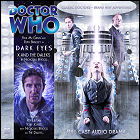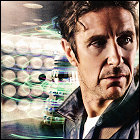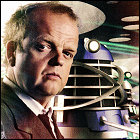 The Doctor is now more certain than ever that Molly is the central pawn in a deadly game playing out between the Daleks and the Time Lords thanks to a traitorous Time Lord. The trail leads back to the planet Srangor, which has been enslaved by the Daleks, and also serves as their base of operations with their Time Lord ally Kotris. The Doctor befriends one of the natives at Srangor, enlisting his help to break into the Daleks’ base, but the Daleks and Kotris are seemingly a step ahead of him at every turn. Kotris has planted something in Molly’s DNA, designed to ensure a permanent Dalek victory over the Time Lords. But Kotris has already been outmaneuvered by an old adversary who knows him intimately. In the meantime, the Doctor simply wants to put an end to the Daleks’ killing… but this time, will he wipe them from history for good to achieve that?
The Doctor is now more certain than ever that Molly is the central pawn in a deadly game playing out between the Daleks and the Time Lords thanks to a traitorous Time Lord. The trail leads back to the planet Srangor, which has been enslaved by the Daleks, and also serves as their base of operations with their Time Lord ally Kotris. The Doctor befriends one of the natives at Srangor, enlisting his help to break into the Daleks’ base, but the Daleks and Kotris are seemingly a step ahead of him at every turn. Kotris has planted something in Molly’s DNA, designed to ensure a permanent Dalek victory over the Time Lords. But Kotris has already been outmaneuvered by an old adversary who knows him intimately. In the meantime, the Doctor simply wants to put an end to the Daleks’ killing… but this time, will he wipe them from history for good to achieve that?
written by Nicholas Briggs
directed by Nicholas Briggs
music by Andy HardwickCast: Paul McGann (The Doctor), Ruth Bradley (Molly O’Sullivan), Peter Egan (Straxus), Toby Jones (Kotris), Nicholas Briggs (The Daleks), John Banks (Thelus / Mezcoranis 2 / Srangor Herder), Alex Mallinson (Mezcoranis 1), Tim Treolar (Lord President / Sandum), Beth Chalmers (Catherine O’Sullivan), Jonathan Forbes (Patrick O’Sullivan)
Notes: The Dalek Time Controller was introduced in the sixth Doctor audio story Patient Zero, reappearing in the final two episodes of the eighth Doctor’s previous adventures, Lucie Miller and To The Death.
Timeline: after Tangled Web and before Night Of The Doctor
LogBook entry and TheatEar review by Earl Green
Review: It’s always a danger, in any time travel fiction – and Doctor Who is by no means the only offender – to build things up to an apocalyptic corner that one can’t escape, and then hit the big time travel “undo” button somehow and undo everything that happened. Star Trek does this a lot (Yesterday’s Enterprise, The Year Of Hell, Cause And Effect, to name just a few). If your  entire series is about time travel, however, hitting that reset button is a dangerous thing – it runs the risk of undermining the entire premise of your show.
entire series is about time travel, however, hitting that reset button is a dangerous thing – it runs the risk of undermining the entire premise of your show.
Dark Eyes pulls that switch, too, but it might have done it in a slightly clever way, having it be the result of the Daleks’ tendency to exterminate first and ask questions later. The entire convoluted plan to destroy the Time Lords has, unknown to almost everyone, involved two incarnations of one Time Lord (and, for once, it’s not the Doctor). By eliminating the wrong irritant from their immediate predicament, the Daleks unspool the entire winding history of their (possibly overcomplicated) plan. Oops.
 But Dark Eyes is guilty of one storytelling crime: in order to get the listener caught up to speed on this vital plot development (which hasn’t reared its head in any of Dark Eyes‘ three previous stories), there’s a sizeable info-dump arranged as a conversation between two guest characters, whose reasons for talking to one another are unusual at best. This conversation is intercut with the climax of the main story so that the listener finds out just what is needed to understand what’s going on. Almost clever, but also clumsy.
But Dark Eyes is guilty of one storytelling crime: in order to get the listener caught up to speed on this vital plot development (which hasn’t reared its head in any of Dark Eyes‘ three previous stories), there’s a sizeable info-dump arranged as a conversation between two guest characters, whose reasons for talking to one another are unusual at best. This conversation is intercut with the climax of the main story so that the listener finds out just what is needed to understand what’s going on. Almost clever, but also clumsy.
Dark Eyes, overall, is a worthwhile story cycle, though its first two installments are its best, and its second half teeters dangerously toward not living up to the build-up. By this point, the story’s saving grace is the chemistry between Paul McGann and Ruth Bradley, and the apparent departure of Molly at the end of the story would appear to be cutting off a great Doctor/companion pairing at its beginning (except that we already know Molly will appear in some capacity in the next box set of Dark Eyes tales). Rather than the much-advertised angle of “darkening” McGann’s Doctor and setting him on a trajectory for the Time War, the end of Dark Eyes instead returns the eighth Doctor to center. Not that we should’ve expected anything else, with the makers of audio Doctor Who hamstrung by a one-of-a-kind license – now completely unique among Doctor Who licensees – forbidding them to set foot into new series territory.
But are things changing? In Night Of The Doctor, Steven Moffat setts an end-point, and drops several broad hints of the circumstances of the eighth Doctor’s regeneration, so there is now a target for which to aim. Now the question becomes, having formally acknowledged Big Finish as real and valid Doctor Who alongside the television series, will the BBC allow Big Finish to delve into the Time War? After all, The Day Of The Doctor sets an end-point for that too, opening the gates for nearly anything to happen in the interim. If Big Finish can’t stretch its wings a bit, we might as well get back to the eighth Doctor traveling with Mary Shelley.
